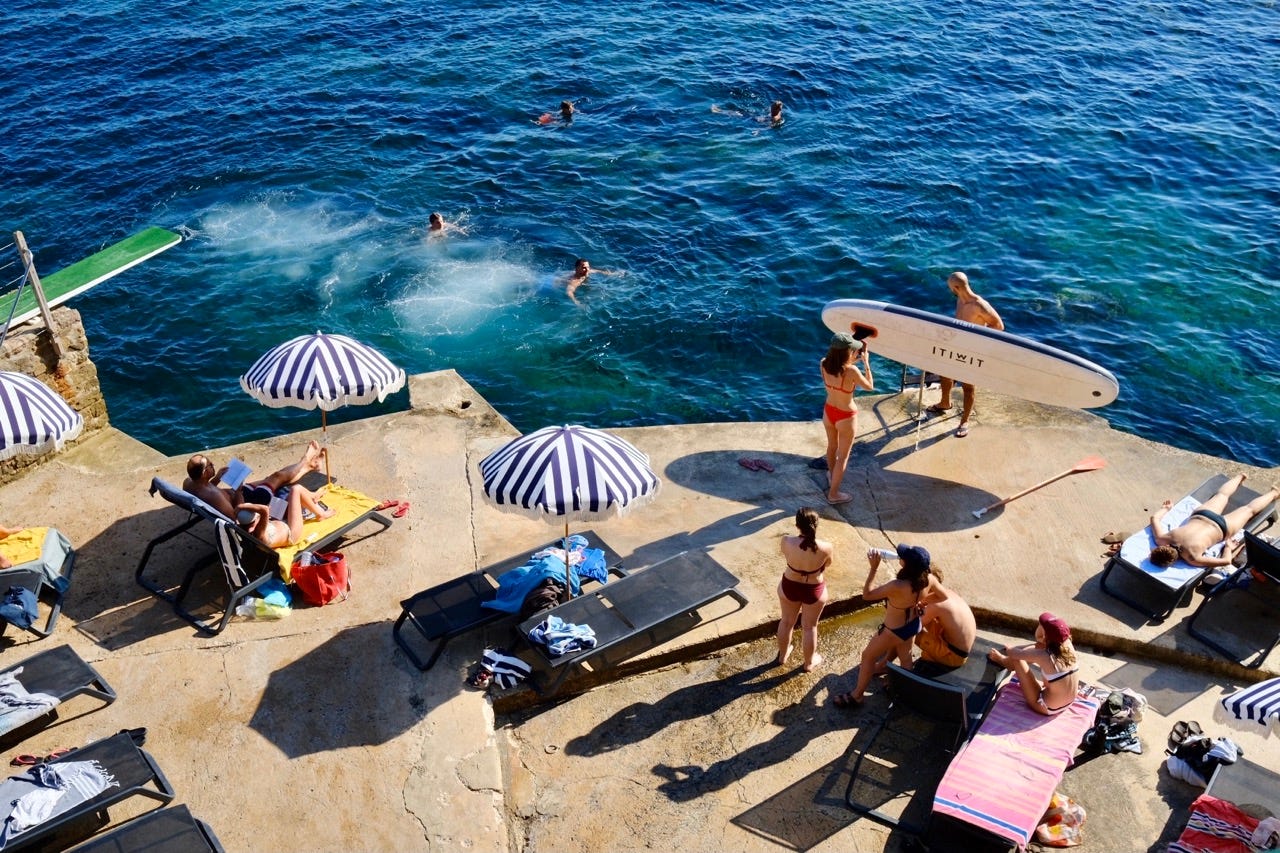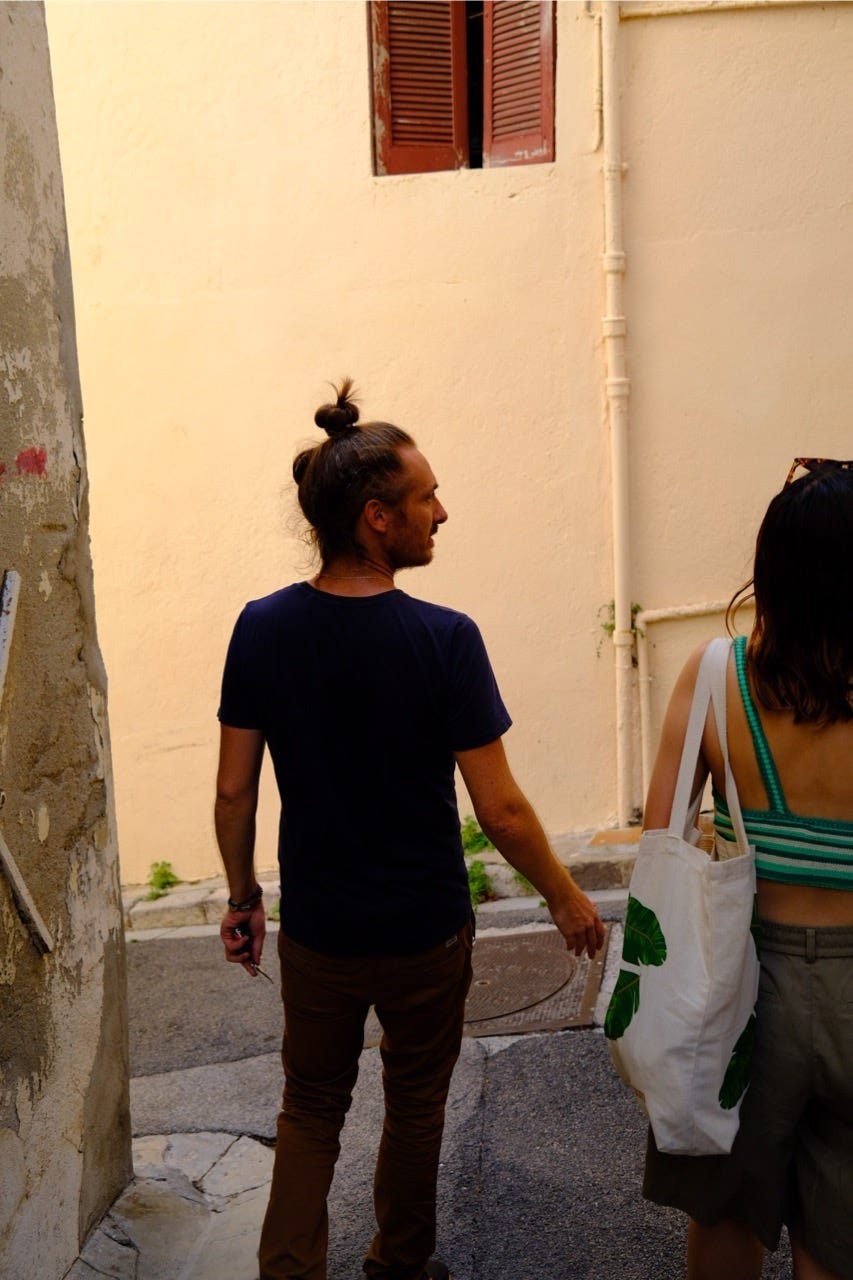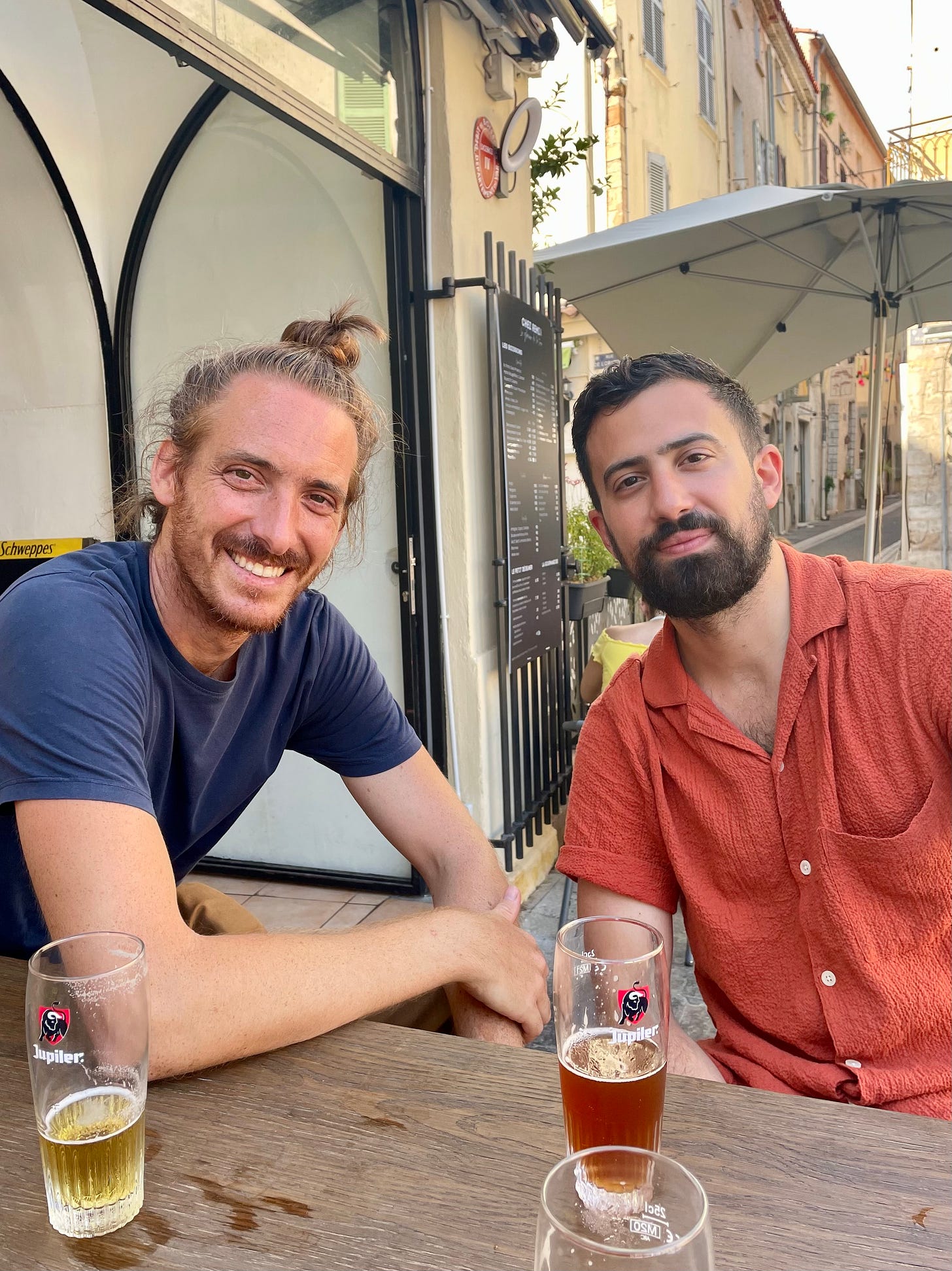Desire Paths is a newsletter about the wild, winding, lesson-filled lives of fascinating people. Thanks for coming on the journey.
Hello! Welcome to the first edition of Desire Paths.
It’s taken me a LOT longer to get started on this than I’d hoped or expected. But big thanks for the incredible support so far and for subscribing. It’s given me a real boost of adrenaline (dopamine?) and a kick in the ass.
The reason for the delay: a few months ago I moved to LA after calling London home for 12 years. My beautiful London. Some say I’m crazy. But the sun was calling and after a dozen years anywhere, sometimes a change of scenery is needed.
Rebuilding in a new country takes a lot out of you. Stress, money, second-guessing. It’s not for the faint of heart. And I’ve had to put a few things on the back burner. But let’s be real. Few people on the planet have a say in where they build their life. It’s a luxury. I’m lucky. And while life’s been wild, it’s also been wonderful. I’ve swapped a terrace flat in the Barbican for a midcentury apartment in Santa Monica. Outside are palm trees, hummingbirds and the Pacific. It almost makes the traffic bearable.
I like it here. I’m happy.
And I’m ready to get started.
—DG
I’m Danny – an editor, photographer, traveller and small business fan. My day job is editorial director of Courier magazine. This is my personal newsletter, Desire Paths.
DP is based on the idea that the most fulfilled, fascinating people in the world are those who look at the boring, comfortable, predictable path they could take in life and say nope. Instead they chase after risky, weird dreams, change careers, make unconventional decisions, or cross oceans to start something new (or just start over).
I’ll dig deep with these people and share everything I learn with you. Let’s go.
#1: A fairytale by the sea
“When you forget to take distance, you start to only see the problems around you. You don’t see the good things.”
This first edition is with Damien Piffet, co-owner of Le Provencal, a hotel on the southern tip of Presqu'île de Giens, a peninsula that itself is at the southernmost part of the south of France. Giens is the end. A Gallic Montauk. Outdoorsy, unpretentious, idyllic.
The hotel was built by Damien’s grandfather in 1951 and is today run by Damien and his brother Benjamin – once-reluctant hospitality operators who were sucked into the vortex of their family biz and are today utterly passionate about modernising it for the next century.
Together they look after the hotel, residences, a private park, pool and beach, a boutique shop, a wildly popular weekly jazz event, four restaurants, and a newly renovated brasserie, Le Guillaume Tell.
Le Provencal is a special place. And Damien’s a special dude. Below, we talk about the hotel and his philosophies on hospitality, family and the good life.
It’s summer and I’m swimming off the coast of Giens – relaxing, floating, eyes to the sky – when something sharp stabs my side. What the fuck?
I paddle in pain to the ladder of Le Provencal’s famous rocky pool deck, climb up, look down, and see it: a satisfied, bobbing, neon-pink blob. Jellyfish. It hurts. And it sort of becomes a whole thing. My wife Kim runs to the small town’s pharmacy for medicine, while a group of French sunbathers point at the water and then at me, whispering (judging?), and an older woman with snorkeling gear shrugs and jumps in anyway.
Fast forward a few hours and we’re in the car with Le Provencal’s co-owner, Damien Piffet, who happens to be Kim’s childhood friend, as he drives around the peninsula, working, meeting suppliers, running errand after errand. I tell the jellyfish tale as if recounting a war story, upon which Damien turns around, pulls up his shirt and reveals a massive sting. Long red tentacled lines. Like something from an alien movie.
‘It happens!’ he says, laughing. And on we drive.
Here’s the thing. I bet that sting wasn’t even the most eventful part of his day. More a minor occupational hazard of running a hotel in a magical place.
In the course of 24 hours, I saw Damien run a bar, wait tables, work behind a front desk, oversee the fit-out of a new bar, shake hands with countless locals on the street, give one of their relatives a job on the spot, play with his kid, bounce between pool and boutique, work an evening jazz concert with hundreds of attendees, make deals, give directions, and take me on a successful, sweaty hunt through old streets to find the spot where Henri Cartier-Bresson shot a very famous photograph.
Damien’s a busy dude. Really busy. And he loves what he does. But he didn’t even want this gig, this life.
At least, not at first…
Damien, how did your family get into the hotel business?
It all started with my grandfather, a chef from Hyères, who decided to try his luck in Paris. There, he met two brothers who’d recently taken over a venue called Le Lido, which had a pool inside and where they put on shows. But the brothers wanted to build a proper cabaret and were looking for a chef to run a gastronomic restaurant for a thousand people. No one wanted to do that because it sounded impossible! So they gave the job to my grandfather, this little chef from nowhere.
This was in 1946. And in six months it became the best performing restaurant in Paris. It was crazy. And by 1949 my grandfather had enough money saved up to buy land in Giens [south of Hyères] where he opened Le Provencal in 1951.
A savvy and entrepreneurial chef!
Exactly. But he still wanted to keep his job in Paris, so he handed the hotel to his family-in-law, my grandmother’s sister and her husband. For the first 35 years Le Provencal was run by my grand-auntie. And then, finally, my parents took over.
Did your mom want to get into the family biz?
Well, she grew up with all the Lido cabaret girls and all of that craziness. Eventually she met my dad, the head pastry chef at a big Paris hotel – the InterContinental Paris le Grand. My mom worked there at the time as the head of the front office.
At one point, my grandfather said to my mom, ‘Okay, someone has to take over down in Giens! Do you want to try it?’ My mom asked to bring her boyfriend. After a bit of hesitation my grandfather agreed, and my mom and dad took over in 1981.
Growing up there, did you feel the hotel was your destiny too?
It’s funny, my parents never gave us the idea that we should take over. They always pushed us to NOT do this business and to go and do something else!
Really? Why?
Even though they raised us around the kitchen and hotel, they said it should be our own decision. That if we weren’t interested, they’d be fine. ‘If you want to be a journalist, go be a journalist. We’ll just sell the hotel. Don't worry.’ They raised us in this spirit. So we never felt that we should take it over, or that we had to take it over. My brother and I said, ‘Okay then, let's go abroad, let’s do something else.’


So where did life take you?
I went around the world – Australia, Hong Kong, Africa for my first internship in a brewery, I did marketing for restaurants, Finland to study in a hotel business school. And yet, weekends and nights, I was always thinking about the hotel back in Giens…
But you never planned to return and run the business?
Never!
Sorry, that seems crazy. That you’d learn the hotel business but didn’t want to run one in the most perfect place.
I just think my parents did the best job to push us away. In the end, they were only seeing problems with the hotel. Growing up, it was just problems with staff, problems with investment, just problems. It’s almost a virus of people who stay in the same place. When you forget to take distance, you start to only see the problems around you. You don’t see what makes something, the business, perfect. The good things. I just felt that if I knew the industry, it would be easy for me to work… somewhere.
But clearly you changed your mind about taking over.
Every time I came back to the peninsula, I’d say, ‘Yeah, okay, come on, this place is amazing’. I’d tell my parents ‘We have to do this, we have to do that, we can do this.’ At some point, you really start to think about who you are and what you’ve come from. This place is crazy, you know? For 70 years people have been coming to Giens and they remember the Provencal. They learned how to swim here. My parents would know people anywhere we went – suppliers, fishermen, former guests, movie stars. People would say 'Oh, Le Provencal!' I never forgot that. I was amazed by it. This place brings people together.
When did the prodigal son return? Walk us through your decision.
I was working in Australia for a company that does events like the Grand Prix. I was in my early 20s at the time. And I get a phone call from my parents. ‘Okay, we found someone to buy the hotel,’ they said. By that point, the hotel was already on the market for five years. My parents had us when my dad was 50 – he's 85 now – so they were getting tired.
After the call, I couldn’t sleep for 3 days. I was like, ‘Whoa, whoa, it's happening!’ And my grandfather said to me, ‘Try it! If anything happens, we can still sell it. But at least try it!’ So, I called my brother, who was working in finance in London, and I said, ‘Okay Ben, I'm gonna give it a go. If I feel underwater at any point, I'll give you a call, and you can either stay or come.’ And then I told my parents I’d come back home.
This was 2010. I stayed with my parents for 2 years, working 20 hours a day at the hotel, until I became crazy. My parents never really embraced the fact that I was there. It was really hard. They pushed so hard that I was saying ‘You either let me try, or you let me fail.’ So I called my brother, just before the Olympic Games in London, and said, ‘Ben, I’m gonna have to quit if you don’t come.’ The next morning he got on a plane and said, ‘How can I help?’ He never flew back to London.
What a brother!
Yeah, I asked him to run the brasserie for two months and we’d see what happens. Sometimes when you have a family business, it's too small. But we had enough space for the two of us, and we had SO much to do – the hotel, residence, beach, pool, restaurants – that we can spend the whole day without seeing each other. I stay with the waiters and front office, and Ben’s in back with the kitchen guys. It's stressful because there’s so much to do, but that's also why it's cool. I'm just a kid with stars in my eyes.
Did the pandemic impact Le Provencal in a big way?
Covid was really damaging at the beginning, when we didn't know what was going to happen. The first phase was painful. We were so worried and didn't know if people would come again. We used to run with 75 employees and had to downsize to 32. We had to learn a new way of managing the restaurant, looking at it week-by-week to be sure that it's profitable.
But what Macron and the government has done for our business was incredible. The loans we got changed everything. And after the lockdowns it was like a tsunami of people. Three days after we reopened, we realised it's going to be crazy.
We’ve had ebbs and flows. And we have to reimburse the money, of course, so we’ve had to be very careful. But now we can invest. And we can also buy a brasserie…
Yes, yes. To make your life even more chaotic, you and Ben have bought Guillaume Tell, a famous brasserie you’ve known since you were kids…
It's true! Our problem’s always been seasonality. We’ve got a very seasonal business that peaks in summer, but we’ve always wanted to have a year-long business. Even if we try to stay open a bit longer, sometimes we might have only 10 clients because it's really just at the end of the world. We didn’t want to think about seasonality anymore.
We’ve always grown up around this old brasserie in Hyères. It's been there for many years, since the 1930s. And we saw it was for sale. I called the agency that was selling it and made an appointment, but they cancelled at the last second because someone’s offer was accepted. It’s a very long story, but that guy ended up pulling out, and months later, we got a call saying the owners accepted our offer.
I bet that caught you by surprise.
Totally. I went back to Giens and said to Benjamin: ‘Uh, we’re in deep shit. They said yes to everything.’
Not ‘congratulations’? We’re in deep shit!
Not at all. We’re in deep shit. Our offer was low and it was sort of a bluff. So now we needed to find a bank! And then the games started. Big smiles. Ben was like, ‘Okay, let's do it! Let's try to convince a bank.’ We found a team, renovated the place, and after lots of delays we finally opened in September. The first day we had like 900 people come around.
When I visited, the brasserie was still a construction site, but you could tell it was turning into something special…
It's a place for everyone, from 7 years old to 90. We call it lieu de vie: we want people to feel they can live there, like they’re in their house, having a coffee with really affordable plates. It’s open all day long, all year long, 6.30 to midnight. We didn’t want to do something super-design, blah blah blah. We want a little 82-year old granny to come in the morning to have her coffee. If the place ends up being Instagram-cool, okay, sure. But the goal isn’t Instagram, the goal is the granny. If granny comes, the rest will come.
You're always running around, putting out fires, juggling projects. What makes you happy?
This place, my kid, my life. I take happiness from the people here and all the topics I can cram into my day. Today I spoke with fishermen at noon, our community manager about the branding of the brasserie at 3pm, and then I was trying to solve a boring issue I’ve got with my office safe. But, like, the other day I met the guy from Daft Punk who told me the hotel was amazing. I was like… what the fuck? That's life.
From buying fish to talking to Daft Punk.
Yeah, that's the big jump that you can have in a day here. But above all, I try to remember to always stay positive, to realize the chance we’ve been given to take on this project, to renew the hotel’s image for the next generation. That’s what drives me every morning. If people say cool things about the hotel, of course that makes me happy, but what makes me even happier is being with my friends and family. Everything else is bullshit. If I have that, I'm the happiest man on earth.
Sounds about right.
I sometimes tell people I'm not actually working. I just wake up in the morning, make a coffee, and live in the little village where I grew up, where I have the people I love. It's kind of like a fairytale.
Go deeper… Le Provencal // Brasserie Le Guillaume Tell
Thanks so much for reading.
Desire Paths is a newsletter about the wild, winding, lesson-filled lives of fascinating people. If you enjoyed it, I’d love if you’d consider subscribing or sharing with a friend.










Truly, this is everything:
> “We want a little 82-year old granny to come in the morning to have her coffee. If the place ends up being Instagram-cool, okay, sure. But the goal isn’t Instagram, the goal is the granny. If granny comes, the rest will come.”
I feel like if most people starts running businesses with this in mind, we’ll all find ourselves the better for it :)